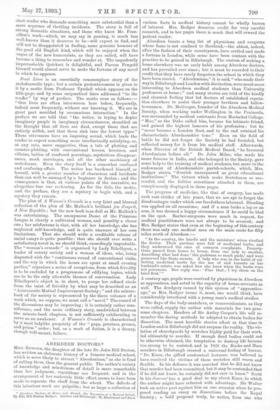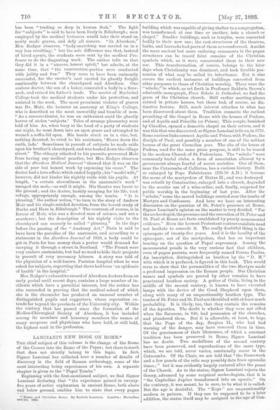ABERDEEN DOCTORS.* Mits. RODGER, the daughter of the late Dr.
John Hill Burton, has written an elaborate history of a famous medical school, which is more likely to attract "Aberdonians," as she is fond of calling them, than the general public. The author's variety of knowledge and minuteness of detail is more remarkable than her judgment, repetitions are frequent, and in the arrangement of her materials little effort seems to have been made to separate the chaff from the wheat. The defects of this laborious work are palpable; but so large a collection of * Aberdeen Doctors at Home and Abroad : the Narrative of a Medical School. Sty Ella Hill Burton Rodger. London and Edinburgh: W. Blackwood and Bora. curious facts in medical history cannot be wholly barren of interest. Mrs. Rodger deserves credit for very careful research, and in her pages there is much that will reward the patient reader.
Aberdeen boasts a long list of physicians and surgeons whose fame is not confined to Scotland,—the ablest, indeed, after the fashion of their countrymen, have settled and made a fortune in London, while some have been content with the practice to be gained in Edinburgh. The custom of seeking a home elsewhere was an early habit among Aberdeen doctors, and has prevailed ever since ; but it must be recorded to their credit that they have rarely forgotten the school in which they have been reared. "Aberdonians," it is said, "who made their way in Edinburgh and London with distinction, were much more interesting to Aberdeen medical students than University professors at home ;" and many stories are told of the kindly and clannish feeling that led doctors of established reputa- tion elsewhere to assist their younger brethren and fellow.
townsmen. Dr. McGregor, founder of the Aberdeen Medical Society, when working under Wellington in the Peninsula, was surrounded by medical assistants from Marischal College.
"Mac," as the Duke called him, became his intimate friend, and gained the highest honours of his profession ; but he "never became a London Scot, and to the end retained his characteristic Aberdeenshire tone." Even on the field of battle be did not forget the Society he had founded, but collected money for it from his medical staff. Afterwards, when Director of the British Medical Board, "he favoured Aberdonians before all." Dr. John Milne, who made his name famous in India, and also belonged to the Society, gave some help to the training of medical students, but more to the endowment of Aberdeenshire parish-schools, which, Mrs. Rodger states, "flourish unsurpassed as great educational institutions." The virtues which make Scotchmen so suc- cessful, and the foibles sometimes attached to them, are conspicuously displayed in these pages.
The progress of medicine, like that of surgery, has made such vast strides of late years, that we are apt to forget the disadvantages under which our forefathers laboured. Bleeding was applied on all occasions; and if a man broke a leg or an arm, it was deemed a happy circumstance if he could be bled on the spot. Barber-surgeons were much in request, for medical practitioners were not always to be secured; and Mrs. Rodger states that even at the beginning of this century there was only one medical man on the main route for fifty miles north of Aberdeen :— "In the country, the laird's and the ministers' wives rivalled the doctor. Their gardens were full of medicinal herbs, and they understood the cure of common complaints. Prescrip- tions passed from house to house, from one lady to another, describing what had done the gudeman so much gude,' and were preserved like State secrets. A lady who was in the habit of col- lecting medicinal herbs for the use of sick tenants on her husband's estate, was asked how she knew when the herbs were not poisonous. Her reply was : 'Pine that ; I try them on the laird first."
A century ago, pupils were received by physicians in Aberdeen as apprentices, and acted in the capacity of house-servants as well. The drudgery caused by this system of "apprentice- age," as Mrs. Rodger terms it, must, one would think, have considerably interfered with a young man's medical studies.
The days of the body-snatchers, or resurrectionists, as they were called, supply the author with materials for two grue- some chapters. Readers of Sir Astley Cooper's life will re- member the daring methods he adopted to obtain bodies for dissection. The most horrible stories afloat at that time in London and in Edinburgh did not surpass the reality. The vio- lation of churchyards by wretches highly paid for their work, led ultimately to murder. If enough dead bodies could not be otherwise obtained, the temptation to destroy life became too strong to be resisted, and in 1828 the Burke and Hare murders in Edinburgh created a universal feeling of horror.
"Dr. Knox, the gifted anatomical lecturer, was believed to have received the victims of these wretches still warm and flexible. In his defence it was asserted that he did not know that murder had been committed, but it may be contended that if he did not know, he certainly did not care to know." Scott in his Journal has a good deal to say about Knox, to which the author might have referred with advantage. Sir Walter took an active part against him on one occasion when he pro- posed reading an essay on dissections before the Royal Society ; a bold proposal truly, he writes, from one who
has been "trading so deep in human flesh." The fight for " subjects " is said to have been lively in Edinburgh ; men employed by the medical lecturers would take their stand on newly made graves, and defy all corners. "In Aberdeen," Mrs. Rodger observes, "body-snatching was carried on in a way less revolting;" but the sole difference was that, instead of hired agents, the students were sent by the medical Pro- fessor to do the disgusting work. The author tells us that they did it in a sincere, honest spirit," but admits, at the same time, that "the resurrection-parties were conducted with jollity and fun." They seem to have been eminently successful, for the carrier's cart carried its ghastly freight continually between the churchyard and Aberdeen. One zealous doctor, the son of a baker, concealed a body in a flour- sack, and ruined his father's trade. The sacrist of 31arischal College took the medical students under his protection, and assisted in the work. The most prominent violater of graves was Dr. Moir, the lecturer on anatomy at King's College, who is described as the most unworldly and humble of men. "As a resurrectionist, he was an enthusiast amid the ghastly horror of stolen subjects.' Tales of strange pleasantry were told of him. As, when busy at the head of a party of students one night, he went down into an open grave and attempted to wrench a coffin-lid open. His hands stuck as in a vice, but, nothing daunted, he cried to his assistants, 'Heave down the earth, lads.' Sometimes in pursuit of subjects he made raids upon his brother's churchyard, and was hooted down the village street." The obloquy attached to his pursuits prevented Moir from having any medical practice, but Mrs. Rodger observes that the Aberdeen Medical Journal" showed that it was on the side of poor but honest work by espousing his cause." The doctor had a love-affair, which ended happily ; his "model wife," however, did not hinder his nightly raids with his pupils. At length, "a certain slovenliness in the anatomist's work" enraged the mob,—as well it might. His theatre was burnt to the ground ; and the doctor, hastily escaping for his life, took refuge, appropriately enough, among the tombs. "It is pleasing," the author writes, "to turn to the story of Andrew Moir and his single-minded devotion, from the horrid study of Burke and Hare in Edinburgh." The contrast, of course, is in favour of Moir, who was a devoted man of science, and not a murderer ; but the description of his nightly visits to the churchyard can scarcely be called "pleasing." In the days before the passing of the "Anatomy Act," Paris is said to have been the paradise of the anatomist, and according to a statement in the Aberdeen Journal of 1829, a body could be got in Faris for less money than a porter would demand for carrying it through a street in Scotland. "The French were very zealous anatomists, but had no need to hide their projects in pursuit of very necessary labours. A story was told of the physician of a well-known Parisian hospital when be was asked for subjects, regretting that there had been an epidemic of health' in the hospital."
Mrs. Rodger's exhaustive record of Aberdeen doctors from an early period until recent days, contains a large number of in- cidents which have a parochial interest, but the author has also succeeded in proving that the medical school of which she is the chronicler has produced an unusual number of distinguished pupils and supporters, whose reputation ex- tends far beyond the precincts of the University city. Within the century that has passed since the formation of the Medico-Chirurgioal Society of Aberdeen, it has included among its members and honorary members the names of many surgeons and physicians who have held, or still hold, the highest rank in the profession.



































 Previous page
Previous page